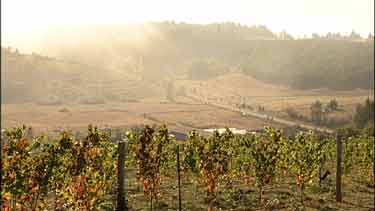Newberg, Oregon. Oregon wine producer and custom grape grower, Dick Shea, came into farming later in life from an entirely different career path. He chose his Oregon vineyard property (Shea Wine Cellars) after six months of careful research, deciding upon a 140-acre pasture in the Yamhill-Carleton District in Newberg. In 1990, when he purchased the property, the only pinot noir grapes being commercially grown were in two other nearby areas, Eola Hills and Dundee Hills. At the time, this unproven location was a bold decision because the pinot noir grape is finicky, and requires just the right mix of soil and climatic conditions in order to commercially grow them successfully. It’s also a grape that is in high demand, and suitable land is in short supply throughout the world.
Although Shea started out as an Oregon grape grower supplying his custom wine grapes to a small cluster of winemakers in Oregon and California. He also began to produce his own wine. After building a winery in 2007, his wine production rose considerably to 6500 cases (in 2009); his acreage of grapes that year also produced 22,000 cases of wine for the winemakers who purchased his grapes.
Shea is mainly interested in working with likeminded winemakers who are creating notable styles of wine from his pinot noir (and Chardonnay) grapes. Working closely with his buyers, decisions made in the vineyard as the grapes are growing will influence the final outcome of the wine.
“When you pick, the level of ripeness that you are getting in the fruit, how much fruit we hang, how many leaves and which leaves we pull to let sunlight into the fruit, all those things will impact the eventual character of the wine. There’s other things obviously that are done in the winery but it starts in the vineyard,” says Shea.
Early on, Dick Shea was forced to replace all his pinot noir vines because of exposure to the phylloxera fungus, and like farmers the world over is no stranger to dealing with risk:
“This is agriculture. We have been through a lot of challenges, that was the biggest one (dealing with the fungus issue), we had to replace all of the 140 acres. And, we have had our short crops and early rains, but we have gotten through them all, and we love the business. We always root for good years, but we love the whole complexity of it, the ride has been a lot of fun.”
Visit Yamhill Valley Wines for their “Wines of the Valley” series that features the history, quality and diversity of the Yamhill Valley’s flourishing wine industry. For the introductory video, along with the video series list, check out the first post on CUPS: The Yamhill Valley Wine Region of Oregon

